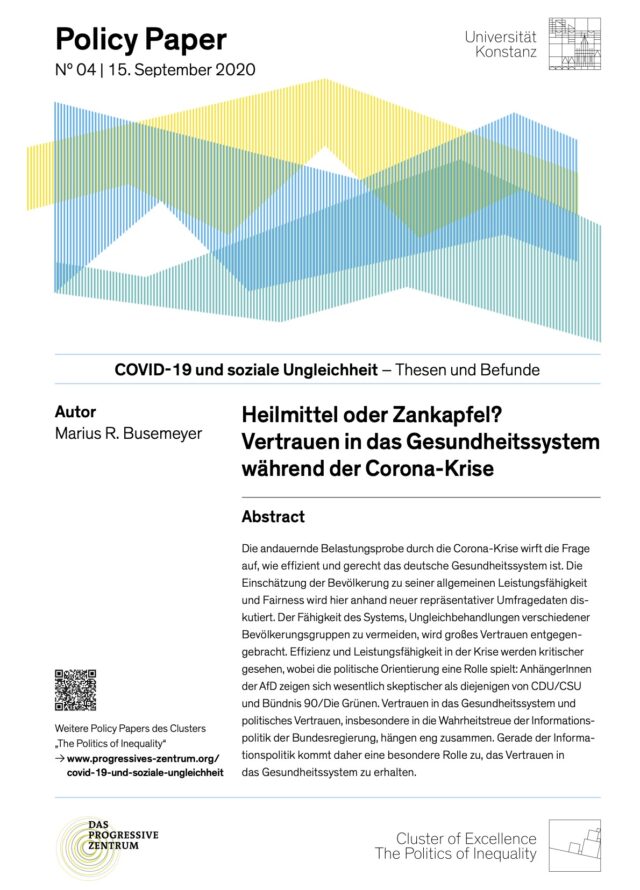Summary
How much trust do citizens put in the healthcare system – and the state in general? Prof. Dr. Marius R. Busemeyer, political scientist and expert in social policy research, provides answers to this question in a study on citizens’ perceptions of the efficiency and fairness of the health care system in Germany. The study is jointly published by the Berlin think tank “Das Progressive Zentrum” and the Cluster of Excellence “The Politics of Inequality” at the University of Konstanz.
The study found that party affiliation is decisive in the assessment of trust: Those who are ideologically close to the Alternative für Deutschland (AfD) distrust the health system and the information policy of the federal government far more often than people with a different party orientation. Gender, income, age as well as levels of education of those surveyed also play a role, albeit to a lesser extent. Thus, the study refutes the hypothesis that there is a rift across society on the issue of trust in state institutions; instead, it provides indications of polarization between a distrustful and dissatisfied minority and the majority rest of the population.
Main findings
- The surveyed population estimates the efficiency of the German health care system as high. 67.6 percent of those surveyed say that they have “very high” or “high” confidence in the healthcare system to provide the necessary care in case of their own coronavirus infection.
- However, the approval ratings vary greatly among different parties’ supporters. While 80.4 percent of those who support Bündnis 90/Die Grünen (Greens) trust the health care system, only 44.1 percent of the AfD supporters do so.
- Both people with higher incomes and the elderly, who even mostly belong to the risk group, have a particularly high level of trust in the healthcare system.
- Those surveyed were less satisfied with the federal government’s information policy. In the overall average of the population, only 48.2 percent agree that the federal government has provided “fairly” or “very truthful” information. The AfD supporters are also particularly suspicious in this respect: only 11.9 percent of them believe in fairly or very truthful information. In contrast, those who are close to Bündnis 90/Die Grünen (69.4 percent) or the CDU/CSU (66 percent) have a lot of confidence in the government’s information policy.
- Only a minority of 36.2 percent believes that the German healthcare system was prepared for such a crisis. Once again, AfD supporters have the lowest rate of 18.8 percent, while CDU/CSU supporters have the highest rate of 45.4 percent.
Background of the survey
The study is based on a large-scale survey program of the Constance Cluster of Excellence “The Politics of Inequality” on the connection between the pandemic and social inequality. Further Information on the survey program, methodology and data basis (DE).


This policy paper was published by the Cluster of Excellence „The Politics of Inequality“ of the University of Konstanz in cooperation with Das Progressive Zentrum.
Authors
When everyone thinks they’re middle-class: (Mis-) Perceptions of inequality and why they matter for social policy

We develop and debate progressive ideas and bring together leading actors who turn thoughts into action. Our think tank’s goal: making the just transformation a reality. ▸ Learn more


